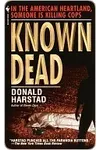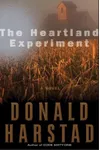Picture a small-town Iowa deputy sheriff trading his badge for a pen to craft gripping crime novels—meet Donald Harstad! Born in 1945, this American storyteller turned his 23-year law enforcement career into a literary sensation with his debut, Eleven Days, in 1998. With tales now published in 20 countries and nine languages, Harstad’s gritty, authentic police procedurals bring rural crime to life with a dash of heartland charm.
Harstad’s stories aren’t just page-turners; they’re a masterclass in blending real-world experience with fiction. His Carl Houseman series, set in the fictional Nation County, Iowa, hooks readers with its raw realism and wry humor. Let’s dive into the life, works, and legacy of this crime fiction gem!
The Making of Donald Harstad
Born in Los Angeles in 1945, Donald Harstad moved to Elkader, Iowa, at age five. After two years of college and a stint in Vietnam, he worked in Hollywood’s film industry before returning to Iowa in 1970. In 1973, he joined the Clayton County Sheriff’s Department, where he served for 26 years, retiring as a deputy sheriff and chief investigator. This rich career shaped his writing, infusing his novels with authentic police procedures and a deep understanding of human nature.
Harstad didn’t plan to become a novelist, but a chilling real-life case sparked his debut, Eleven Days, written in just 11 days. His knack for capturing the quirks of small-town life and the intensity of crime investigations launched him into the literary spotlight.
Donald Harstad’s Unforgettable Stories
Harstad’s novels, all set in the fictional Nation County, revolve around Deputy Sheriff Carl Houseman, a relatable, middle-aged cop with a sharp mind and dry wit. His debut, Eleven Days (1998), kicks off with a horrifying 911 call leading to a Satanic multiple murder. The fast-paced procedural, rooted in a real case, earned an Anthony Award nomination for Best First Novel and set the tone for Harstad’s career.
Subsequent books like Known Dead (1999) tackle cop-killing ambushes, while The Big Thaw (2000) explores casino boat heists, and Code 61 (2002) dives into a bizarre vampire-like suspect. Harstad’s style is documentary-like, with meticulous police procedures and a deadpan narrative that balances gritty crime with self-deprecating humor. His ability to weave small-town dynamics—petty jealousies, quirky characters, and surprising depravity—makes his stories resonate globally.
His final novel, November Rain (2010), takes Carl Houseman to London to consult on a kidnapping case, showcasing Harstad’s versatility while retaining his signature authenticity. Fans praise his books for capturing Iowa’s rural atmosphere, though some note the settings could fit any small town, amplifying their universal appeal.
Why Donald Harstad Matters
Donald Harstad’s impact lies in his ability to humanize law enforcement and rural life. His novels demystify police work, showing the tedious yet thrilling reality of investigations, from writing reports to chasing leads. By drawing on his 26-year career, he offers readers a rare glimpse into the heartland’s underbelly, where modern crime invades quiet towns. His work, translated into nine languages, bridges cultural gaps, proving that great storytelling transcends borders.
Though some fans lament that Harstad’s series didn’t reach the fame of Craig Johnson’s Longmire, his cult following cherishes his authentic voice. Harstad’s legacy endures as a storyteller who turned Iowa’s farmlands into a thrilling crime fiction stage, inspiring readers and writers alike.
- Born: June 14, 1945, in Los Angeles, California
- Key Works: Eleven Days, Known Dead, The Big Thaw, Code 61, November Rain
- Awards: Nominated for an Anthony Award for Best First Novel (Eleven Days)
- Lives: Elkader, Iowa, with his wife, Mary
Ready to crack open a thrilling police procedural? Snag Eleven Days and dive into Donald Harstad’s gritty, heartland crime world!






